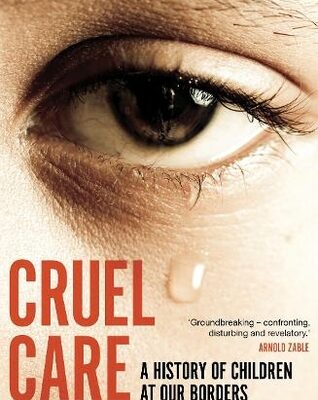Book Review: Cruel Care: a history of children at our borders
Jordana Silverstein, Monash University Publishing, 2023, 309 pages
NOTE These reviews are not peer-reviewed by credentialled experts, so usually avoid professional criticism. Their purpose is to promote awareness of authors and new books to a non-specialist audience – most academics do not prioritise writing book reviews for lay readers. In this case, the theoretical perspectives of Dr Silverstein, coming from fields in which I am largely ignorant, are not being contested. However, I point to arguments where this audience may seek more comparison with alternative perspectives.
As a cultural and migration historian, Dr Jordana Silverstein asks why many Australians – certainly those who dominate the public space – play the “drowning children” card to justify “stopping the boats”.
On the face of it – in the “framing” and “influencing” of politics – the answers are simple. Government is “doing it for the kids”, innocent victims of their deluded or bad parents, which of course is cover for the harsh and deterrent response which would happen anyway. Despite this focus achieving public attention and support for boat turnbacks, it became a two-edged sword. The offshore detention, isolation, deaths, medical and psychiatric damage to earlier arrivals generated disapproval, and the public’s sympathy for child refugees was transferred to this cohort. Persistence and visibility over many years by refugee advocates such as ChilOut and Grandmothers for Refugees – now broadened to family support – was consistent with mainstream values, despite the opposition to boats remaining. After 2019, during the term of the last Morrison government, Dr Silverstein notes that refugee children were of little public interest except for the Tamil family in Biloela, Queensland. This family was still a “burr under the saddle,” but thanks to their supporters around Australia, Labor quickly granted them permanent residency. Was it a win for a family-supportive policy, or a sop to dissipate pressure and demobilize the pro-refugee movement? The new government continues the boat turnbacks with vigour and without apology.
But Dr Silverstein’s perspective is big picture and long-term, based on a theory which sees the child-focus through a colonial-settler interpretive lens. She believes that “Australia’s settler colonialism has a deep impact on child refugee policy”, and modern policymakers “think about their task of controlling and governing … shaped by the nation’s colonial mindset”. Not only was control of the land and the First Nations’ population the founding objective, but even now “Australia’s key national imperatives are to control the land and the population…(which) is created and reinforced every day by individuals in positions of power.”
The development of the ideological construct of ‘children’ is discussed at length: between the two World Wars there was a “particularly sentimentalised idea of children as vulnerable” followed by UN agencies seeing them in the post-War period through the lens of ‘rescue’, then in the 1960s in Asia as pitiable beneficiaries of an apolitical humanitarianism. This “framed white donors as secular heroes and saviours”, an “Anglicised hierarchy of ideas of family”, with the “immigrant or refugee child…embroiled in the creation of racialized parent and familial ideals.” She emphasizes this historical continuity strongly throughout the book: the cruelty towards the Stolen Generation of indigenous children “has later been enacted on refugee children, also under the banner of care.”
Her expansive interviews with thirty-five Immigration Ministers and officials of government and refugee organisations, provide us with some insights into policymaking and how it is presented in administrative and language discourse around “the best interests of the child” and “crisis”. There is much commonality and bipartisanship in their approaches, and a path dependency results, with few options seen outside the conventional wisdom. The post-Vietnam War semi-planned, semi-authorised Vietnamese Government evacuations are discussed in interviews, but not as models with current relevance. She doesn’t see her role as finding policy alternatives: “it is not my place as a colonizer on Indigenous land to say precisely what should happen with that land.”
In her theoretical framework, she endorses Naomi Klein’s idea of “crisis” being used by the state with its own colonial, capitalist and patriarchal agenda, “narrated as problems and cast as opportunities.” This resonates due to the labour-trafficking scams under the previous government from 2014, when largely bogus claims for asylum were made by entrants with student or tourist visas arriving by plane from Malaysia, Vietnam and China. How can we understand the minimal follow-up by officials and Ministers, other than as its potential for an expanded underclass of illegal migrant workers, as exists in the US and Europe? Restructuring Australian economy and society by serving the interests of big capital in this way is not considered by the author, although arguably a stronger influence then her preferred colonialist-settler lens.
An interdisciplinary awareness is shown by a frequent sprinkling of quotes from scholars in literary, anthropological, philosophical, criminology, geography, queer theory, historical and other fields, but without their fuller argument and context, it isn’t clear how aligned these scholars are to Silverstein’s colonialist-settler paradigm. There is no reference to the ongoing influence in UN and child mental health circles, from the late 1940s, of John Bowlby’s Attachment Theory, although it seems likely to have informed the 1948 political debates mentioned in the book. T.W. White MP (he of the ‘two Wongs don’t make a White’ controversy) asked Immigration Minister Calwell why private adoptions – rather than institutional placements – were not provided for in the legislation. Calwell later accommodated White’s suggestion, saying he agreed to advice from ‘officers expert in child administration’. Is Bowlby’s influence on generations of Australian child welfare experts for decades afterwards consistent with the colonialist-settler paradigm? Has the author drawn a long bow in seeing the ‘original sin’ of Australia’s state formation as the driver of current policy? Her iconoclasm will hopefully generate much discussion.
Kevin Bain is a retired economic analyst and university teacher. His Refugee Reading Guide is at Bayside Refugee Support. It has short summaries of about 100 books published over the last 20 years.
